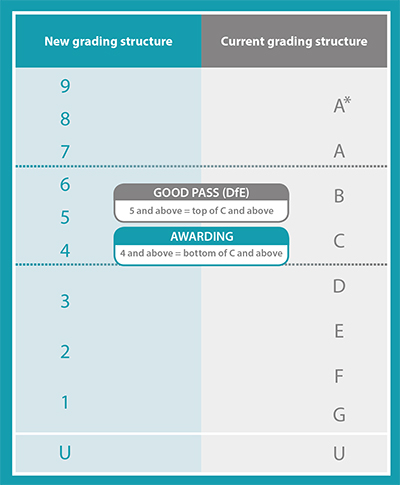How to Decipher Candidate Qualifications
Your recruitment career
With changes to the UK education system a common occurrence, keeping up-to-date with grading systems and qualification levels will help you understand the academic achievements of school leaver and graduate CVs.
Clients expect your expertise when it comes to matching candidates to their roles, and this includes knowing where prospective employees sit academically. How well do you know UK qualifications? Keep reading to find out...

Did you know?
From 2017 the GCSE grading scale will change from a letter based system to one based on numbers.
Taken by 14 - 16 year olds, GCSEs are the most common qualifications you’ll see on a ‘first jobber’ CV, so knowing how the grading change will affect qualification listings will help ascertain where pupils sit academically.
The table on the right, designed by Ofqual, outlines the new GCSE grading system.
Qualification and training options after GCSEs
These are the most common post-GCSE qualifications you’re likely to see on a CV, alongside an explanation of what they mean.
Apprenticeships: Offering on-the-job learning combined with study, apprenticeships provide the opportunity for young people to learn about an industry while developing practical skills. Apprenticeships have equivalent educational levels, as shown below:
Intermediate level 2 - five GCSE passes at A* to C Advanced level 3 - two A level passes Higher levels 4, 5, 6, 7 - Foundation degree and above Degree level 6, 7 - Bachelor’s or Master’s degree
The new Apprenticeship Levy (introduced in April 2017) will fundamentally change the way businesses invest in talent. Find out more about recruitment apprenticeships here.
A and AS Level Qualifications: Intended for learners who want to get a deeper knowledge of a particular subject over a two-year period. Pupils commonly take four subjects at AS Levels and three at A Level. Qualifications are awarded on a scale from A* - E.
Higher and Advanced Higher: In Scotland these are the national school-leaving certificate exams studied in place of A Levels. Highers are awarded at grades A - C, and Advanced Highers are awarded at grades A - D.
Higher National Diplomas: These vocational qualifications provide work-related training across a range of sectors. The most common you’re likely to see on a CV are BTEC, NVQ, SVQ and SQA (Scotland). Vocational Qualifications are available at different levels, with a Level 3 equivalent to A Levels.
Foundation Degree: The equivalent of two thirds of a full honours degree, this is often taken by students looking to move into vocational fields, or by those whose school-based education didn’t provide them with the qualifications needed for higher education.
Undergraduate Degree: Topic specific, an undergraduate degree represents primary higher education study over a period of usually three years, although some courses are considerably longer.
Qualification levels can be confusing, so getting to grips with the basics is a good idea if you commonly recruit school-leavers and ‘first jobbers’.
Read our IRP Professional Guides on deciphering qualifications, GCSE grading changes and picking a stand out CV for more information.
Remember to share this post on your social channels. You can follow the IRP on Twitter, Instagram and like us on Facebook.
Share this article

